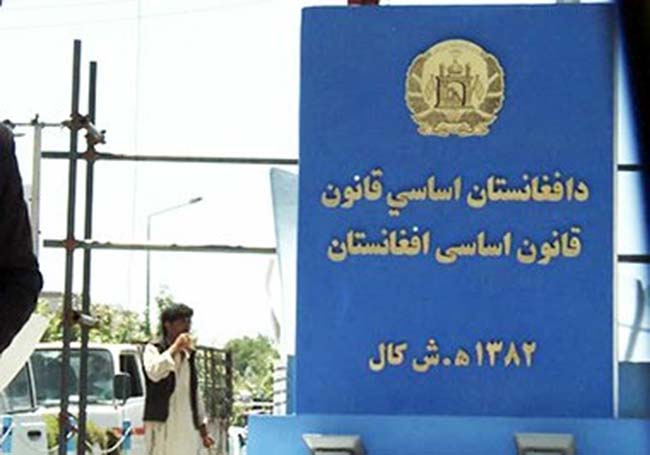According to some studies, almost all articles of the Constitution of Afghanistan have been violated over the past 13 years. According to the findings of the survey, 161 out of the total 162 articles of the Constitution have been contravened over the past few years; the only article which has not been violated so far is Article 21 of the Constitution that reads, “Kabul shall be the capital of Afghanistan”. The study has also found out that all three branches of the government (the Judiciary, Legislative and Executive), including the President, have infringed the Constitution. Violation of the provisions of the Constitution on such a large scale is of great concern, and a shameful reality of the rule of the law in the country. If the supreme law, as the source of all other laws, is broken to this extent, the violation of other laws has pretty much become a customary exercise.
Laws are designed and introduced to ensure justice, and protect the rights of citizens in a country. It is the rule of law that draws a distinction between human societies and wildlife, and provides a safe environment for people to live in. Laws on paper and without rule can never help societies. Based on reports, flaws and loopholes in Afghan laws, especially the Constitution, have also contributed to their increased violations. Some ambiguities and deficiencies in the Constitution and other laws have given the transgressors a window to enjoy impunity, and have led to the blatant and rampant corruption in the judicial institutions, where it has practically become a way of life. The main victims of the violations of the Constitution and other laws are the poor Afghans, who no longer can tolerate the trend.
Violation on such a massive scale underlines the need to convene the Constitutional Loya Jirga, and address all the existing flaws. Additionally, for the just and equal implementation of laws, the law enforcement agencies should be strengthened, and corruption tackled, because only law amendment cannot suffice. Howsoever enriched and better laws we have, justice cannot be ensured unless there is rule of law. Afghans can no longer endure laws which are only meant to be enforced on the indigent, and which provide for the bribery of law enforcement agencies, and cannot help ensure justice.
In particular, human rights and internal conventions widely violated, Threats, intimidation and attacks against human rights defenders continued in a climate of impunity, with the government failing to investigate cases and bring those suspected of criminal responsibility to justice. Human rights defenders suffered bombings, grenade attacks and assassinations by state and non-state actors. Women participating in public life are at greater risk of discrimination and violence than men because of different social and political reasons. According to one report, the Ministry of Women’s Affairs registered more than 4,000 cases of violence against women. Violence against women was severely unreported in Afghanistan due to insecurity, lack of a functioning government or judiciary, and traditional practices which combined to discourage victims and their families from reporting violence. The government committed to take practical steps to improve women’s participation in governance but failed.
Overall the unprecedented grow of insecurity with insurgency and criminal activity worsening across the country. According to Amnesty International Organization, The first three months of 2015 were the most violent of any equivalent period on record. Thus, The UN Assistance Mission in Afghanistan (UNAMA) recorded 1,592 civilians killed and 3,329 injured in the first six months of 2015, while 70% of civilian casualties were attributed to Taliban and other armed insurgent groups, and 16% to pro-Afghan government forces. The Taliban increasingly attacked soft and civilian targets. In September the Taliban took control of most of Kunduz province, and the government reported that some 20,000 people were internally displaced due to the conflict. The majority did not receive any humanitarian assistance from the government while in 2016 insecurity challenges, political and social disorders much more increased.
Accordingly the labor law, The Afghan Labor Law, adopted in 2007, guarantees Afghan citizens the right to work and receive fair treatment, equitable pay, pensions, and health and safety in the work place. The new Labor Law, adopted by the Parliament and approved by the President in February 2007, explicitly provides broad provisions for the protection of workers as guaranteed by the Constitution. With respect to internationally-recognized labor principles, Afghanistan has ratified three of the eight Core Conventions related to core labor standards (Conventions 100, 105, and 111). Though laws in Afghanistan protect workers from discrimination and children from forced labor practices, the 2007 Afghan Labor Law and internationally- recognized labor standards are not well known among Afghan citizens at the national or provincial levels. This is important responsibilities of MoLSAMD to provide jobs and monitor governmental and non-governmental organizations to strengthen understanding, awareness, implementation, and enforcement of the all laws in Afghanistan. But Afghanistan is one most exploiting, unemployed and misemployed countries in the world.
As a final point, most of new generations have realized that it is more dangerous to tolerate worsening conditions of lawlessness, discrimination, misery, violence, hatred and incompetency anymore. It is proven when the Rule of Law disappears; we are ruled by the whims of corrupt men. The more we tolerate, the more we repress. I do not believe that the hungry man should be treated as subversive for expressing his suffering. It is never acceptable that the law can be used to justify tragedy, to keep things as they are, to make us abandon our ideas of a different world. Law is the path of liberty as must as such open the way to progress for everyone.
Home » Opinion » When the Rule of Law Disappears
When the Rule of Law Disappears
| Mohammad Zahir Akbari

